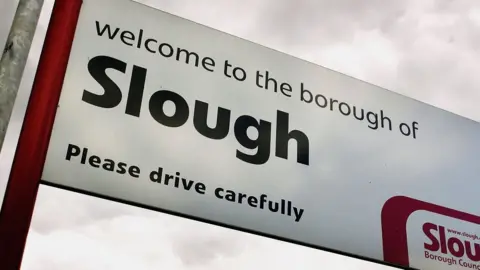Slough Borough imposes emergency curbs on spending
 Getty Images
Getty ImagesA council has imposed emergency controls on its spending, after revealing a £56m financial deficit.
Slough Borough Council has issued a Section 114 notice which restricts its spending to essential services.
The Labour-run local authority had previously invested heavily in property and land for development.
The council's chief executive said its problems stemmed from "a range of challenging financial issues".
A Section 114 notice is issued when what a council is receiving in revenue is insufficient to cover its spending.
A council report said the Berkshire local authority faced "a financial situation of an extremely serious nature".
Spending on services was "significantly above the approved revenue budget," with a £56m deficit estimated, it said.
The Labour-controlled council quadrupled its borrowing since 2016, to £760m, much of it channelled into property investment.
Purchases included the Odeon Cinema in Basingstoke, the site of a Wickes store in Wolverhampton and a Waitrose supermarket in Gosport.
The council also owns two hotels in Slough town centre, opened recently in a joint venture with Marriott.
'Wrong path'
The council report highlighted it having "effectively no unallocated general reserves" and said if unchecked, it would face a £159m deficit by 2025.
Chief executive Josie Wragg, said financial problems had "grown in scale over a number of years".
"We were on the wrong path financially, but we are committed to making the changes needed and as officers, working with the political leadership and government to reduce disruption as much as is possible."
"Residents should be reassured this notice does not mean any immediate change to services; we will still be collecting your bins next week, safeguarding the most vulnerable in our town, maintaining the roads and supporting schools."
Earlier this year, external auditors Grant Thornton LLP revealed the council's general fund reserves - needed to cover unforeseen or emergency spending - had fallen by more than £7.5 million to £500,000 at the end of 2018/19.
It also found "insufficient capacity and skills within the finance department".
